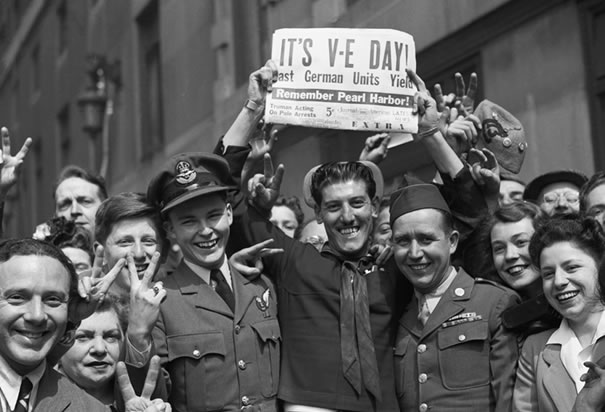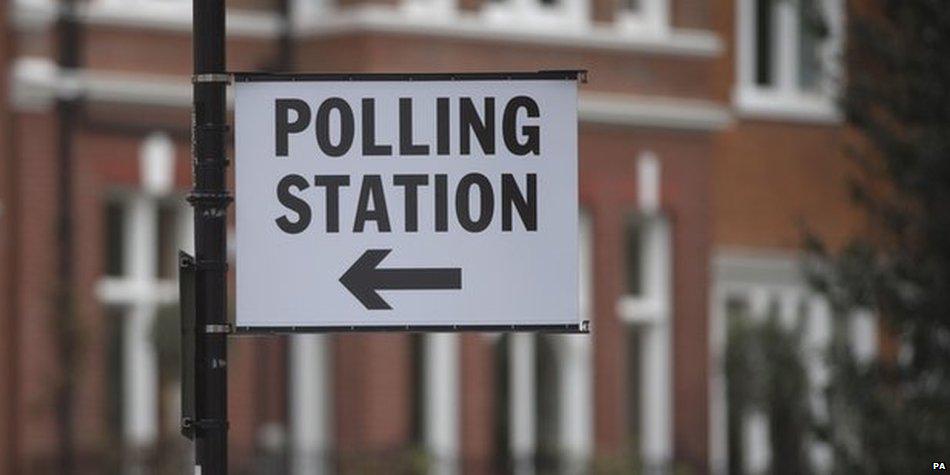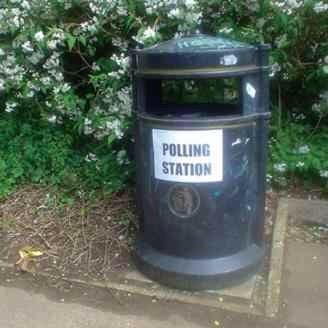
The BBC will be ‘celebrating’ VE Day over the next few days and you kind of know the narrative they will be pushing, apparently celebrating the men and women who defeated the Nazis but the real message will be ‘how terrible it all was’ with copious amounts of equivocation and ‘balancing’ the narrative with tales of Allied ‘war crimes’ such as Dresden or Hamburg…..in one interview I heard the BBC managed to find three people from the era who were entirely negative about VE Day and claimed either not to have been excited about the war ending and VE Day, or who said they saw no celebrations…the newspapers must have been reporting from a different London apparently….and h/t Doublethinker, the BBC ran a programme a couple of days ago about VE Day which ended up as a piece of propaganda for the Labour Party…the ‘creators of the NHS’….which is a lie…Labour merely, and reluctantly, implemented plans put in place by a Tory PM and a Liberal, William Beveridge.
The old soldiers, sailors and airmen who made all those sacrifices must wonder if it was all worth it as they look on at an ever more undemocratic European Union that pays lip service to democracy making people vote again and again until they get the ‘right’ result, the import of an ideology into Europe that bears remarkable similarities to Fascism and yet is pandered to by politicians and Media types of all creeds, and the final insult is a British Broadcasting Corporation that besmirches all they achieved and itself supports that ‘fascist’ narrative and helps raise the old spectre of anti-Semitism across Europe once again with its very one sided and unbalanced portrayal of Israel…not that the BBC was held in high esteem during the war….often then thought to be too friendly towards the Nazis if you read the ‘Mass Observation’ reports of the time.
The BBC is infamous for its line that the bombing of Dresden and Hamburg were war crimes….
So in light of that below is a report from the Mail in 1945 that tells of, and celebrates, the massive bombing campaign against Berlin…it makes a fascinating contemporary read….before the BBC has had the chance to rewrite history to suit their own verdict on how the war was won…….
Note just how massive the bombing was, how Berlin was not just a city but a factory for the war effort and how private homes had been turned into mini-factories turning out equipment for the German war machine….and just how much the bombing was deemed to have helped win the war…….
How RAF’s awesome bombing of Berlin ended in …
45,000 TONS OF VICTORY
- BY OUR DEFENCE CORRESPONDENT
Some 850 bombers did not come home
THE last bomb has fallen on Berlin. Pathfinder crews of the RAF have planted their last zig-zag trail of skymarkers across Europe to guide the bomber streams to Hitler’s capital.
The flak guns, hundreds of them, that girdled the city with a curtain of steel have ceased to bark. Groping searchlights have been turned out for the last time.
As news of these tremendous truths came from the loudspeakers in RAF messes at scores of isolated airfields, our bomber crews could be excused a feeling of jubilation. To many of them the news had a poignant personal meaning.
Their minds went back to nights of high adventure and terrible danger high over the nerve centre of the Reich — nights of unbelievable ack-ack fire, with Nazi fighters lying in ambush, friends going down in flames, awful moments as searchlights found their mark and nerve-racking anxiety as bombers limped home with engines knocked out and petrol tanks drained too soon.
For these young men, old before their time, the capture of Berlin was a moment of personal triumph.
Without their help — they and the comrades who never returned — the German capital might still be flying the Swastika.
They are the soldiers who fought their Berlin battle thousands of feet above the Earth, months before even the Normandy beach-head was established.
Already the Russians, first to reach Berlin by land, have paid tribute to the fruits of Bomber Command’s courage.
It is not the physical possession of Berlin’s ravaged streets that is so important. What the experts want to find out from inspection of the debris and analysis of the factory timesheets is the precise extent to which our strategic bombing aided the land armies on both Eastern and Western fronts by cutting off enemy supplies.
Their report will be the definitive textbook of strategic bombing, destined to become a classic among the manuals of military science. For, apart from its many great war factories, this city of 4,400,000 people was the world’s capital of home working.
Under the Nazi’s vast dispersal plan, hundreds of private Berlin homes became miniature factories. The Germans have a word for it –—Heimarbelt. It means ‘ industrial homework’. Lathes and benches were set up in dining rooms and bedrooms.
One traveller has described his amazement when, passing along a Berlin street during an RAF raid, the wall of a private house collapsed to reveal a workman’s bench in the living room.
Bomber Command has been hammering at Berlin since August 25, 1940, when twin-engined aircraft dropped 22 tons of bombs. But the Battle of Berlin proper did not begin until the night of November 18, 1943, when 444 bombers went out and dumped 1,594 tons among the city’s factories.
Since the war started, Bomber Command has blasted and burned Berlin with close on 45,000 tons of incendiaries and high- explosive bombs. There have been 22 major raids of 500 tons and over.
The Battle of Berlin proper lasted four months, during which more than 30,000 tons were showered on the city, most of them in 13 monumental attacks.
Berliners had their worst night on February 15, 1944, when Air Chief Marshal Sir Arthur Harris sent 750 planes carrying 2,500 tons.
When the battle ended, 326 factories had been destroyed or damaged, including five classified as ‘priority one plus’.
The effects of this continuous blitzing spread through Germany’s war economy like the everwidening ripples of a pond into which a pebble has been tossed.
You can even trace part of the enemy’s recent disastrous oil shortage to the destruction of electrical engineering plants during the air Battle of Berlin.
Heavy electrical equipment needed for the completion of some of the enemy’s synthetic oil plants never arrived, and those plants failed to go into production.
So, when you see pictures of Red Army troops planting the Russian flag on Berlin’s bomb- scarred chancelleries, give a cheer for the RAF flyers who made possible that symbolic act of conquest.
Also cheer the ‘erks’ — or aircraftsmen — who sent out our Lancasters, Halifaxes and Stirlings with engines running smoothly and gadgets working right.
And do not forget the boffins who gave our bombers their ‘magic eye’ radar and devised ways of foxing the Luftwaffe night fighters.
In all, Bomber Command has flown well over 20,000 sorties against Berlin.
The cost has not been light. More than 850 bombers did not get back. The rate of loss for the whole of Bomber Command’s other operations is just half that figure.






 Robert Peston
Robert Peston  BBC Breaking News
BBC Breaking News 


 Larry the Cat
Larry the Cat 

